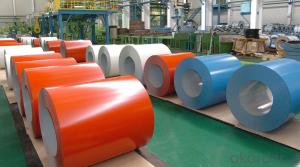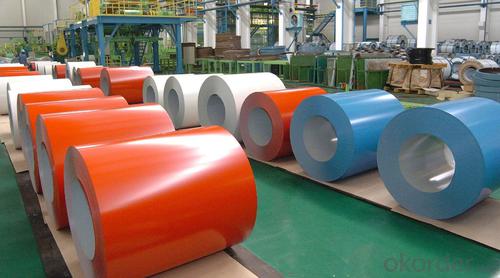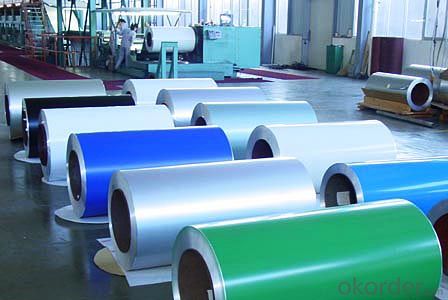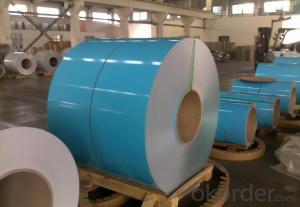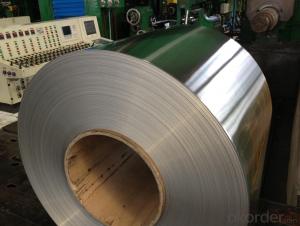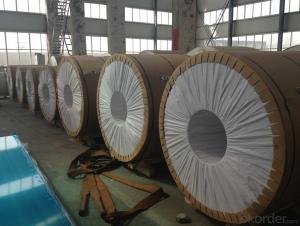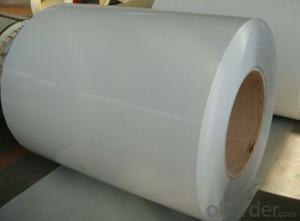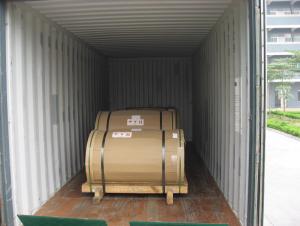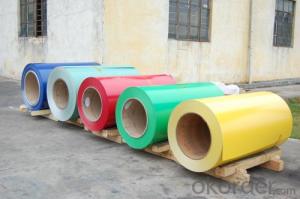Aluminum Coils for Sale - Aluminium for Glass Wall Prepainted Coil
- Loading Port:
- Shanghai
- Payment Terms:
- TT OR LC
- Min Order Qty:
- 5 m.t.
- Supply Capability:
- 2000 m.t./month
OKorder Service Pledge
OKorder Financial Service
You Might Also Like
Specification
Structure of Aluminium for Glass Wall Prepainted Coil Description:
Coated aluminum coil/sheet are of a wide range of colors, which gives wonderful appearance no matter in residential and commercial constructions of great exhibition centers.
The coated aluminum coil/sheet have been widely used in the fields of construction and decoration( garage doors, ceiling etc.), electronic appliances, lighting decoration, air-condition air pipes, sandwich panels and drainages etc.
Main Features of the Aluminium for Glass Wall Prepainted Coil:
1) High flexibility
2) Impact resistance
3) Excellent weather-proof durability
4) Anti-ultraviolet
5) High erosion resist
Images of the Aluminium for Glass Wall Prepainted Coil:
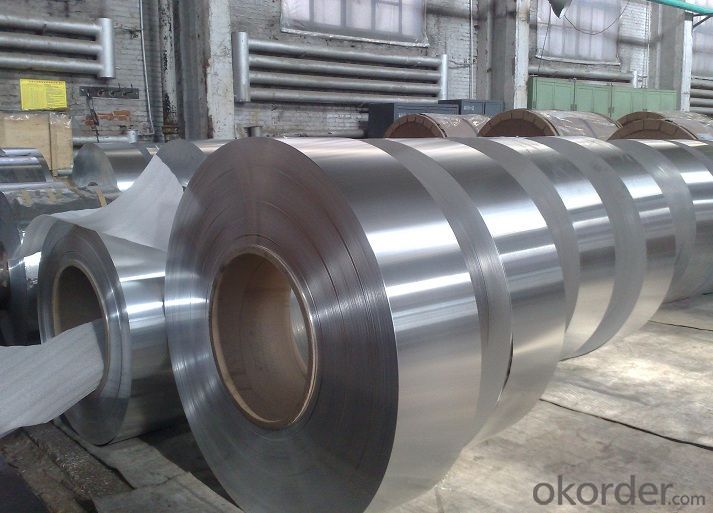
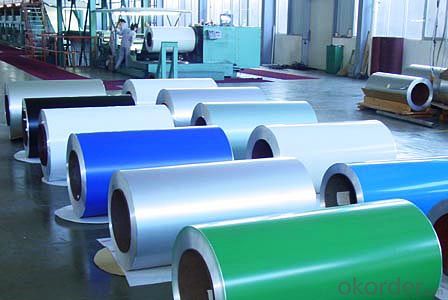
Aluminium for Glass Wall Prepainted Coil Specification:
Alloy | A1100,A3003,A1050,A8011 etc |
Temper | H16,H18,H24 |
Thickness | From 0.024mm to 1.2mm |
Width | Standard width:1240mm |
Special width:1300mm,1520mm,1570mm,1595mm | |
Diameter | Standard dia:1200mm |
Interior dia:150mm,405mm,505mm | |
Weight | 2.5 T/coil,3.0 T/coil |
Coating | PE, PVDF, AC |
Surface | Embossed, mill finish, coated |
Color | AS to code RAL |
Gloss | 10-90%(EN ISO-2813:1994) |
Coating Thickness | PE: more than 18 micron |
PVDF: more than 25 micron | |
Coating Hardness (pencil resistance) | More than 2h |
Coating adhesion | 5J(EN ISO-2409:1994) |
Impact Resistance | No peeling or cracking(50 kg/cm,ASTMD-2794:1993) |
Flexibility (T-bend) | 2T |
MEK resistance | More than 100 |
FAQ:
a.What is monthly capacity
---CNBM is one stated own company and our monthly capacity is about 2000tons.
b. Now which countries do you export your goods?
---Now we export to South East Asia,Africa, North America,South America ect.
- Q: Are aluminum coils affected by magnetic fields?
- Yes, aluminum coils can be affected by magnetic fields to a certain extent. Aluminum is a non-magnetic material, meaning it does not possess any inherent magnetic properties. However, when exposed to strong magnetic fields, aluminum can experience an induced magnetic field due to a phenomenon called electromagnetic induction. This can result in a slight attraction or repulsion between the aluminum coil and the magnetic field, although the effect is generally weaker compared to materials with magnetic properties, such as iron or steel. It is important to note that the degree of interaction between aluminum coils and magnetic fields depends on several factors, including the strength and proximity of the magnetic field, the shape and size of the coil, and the specific composition of the aluminum alloy used in the coil.
- Q: Can aluminum coils be used for architectural applications?
- Aluminum coils are indeed applicable for architectural purposes. With its versatility and lightweight nature, aluminum is an ideal material that boasts exceptional resistance against corrosion, making it suitable for numerous architectural applications. Exterior cladding, roofing, facades, and even interior uses like ceilings and wall panels can all benefit from the utilization of aluminum coils. These coils are easily malleable, cuttable, and moldable, allowing for flexibility in design and innovative architectural solutions. Moreover, aluminum coils can be coated with diverse finishes, such as paint or anodized coatings, to enhance both aesthetics and durability. All in all, due to their adaptability, durability, and aesthetic charm, aluminum coils are highly favored within the architectural industry.
- Q: How are aluminum coils cut and shaped?
- Aluminum coils are cut and shaped using various methods and tools, depending on the desired shape and size. The most commonly used techniques include slitting, shearing, and laser cutting. Slitting is the process of cutting a wide coil into narrower strips. It involves feeding the coil through a set of circular blades that make precise cuts along the length of the coil. This method is commonly used to produce thin strips of aluminum that are then further processed or used in various applications. Shearing is another common method used to cut aluminum coils. It involves using a machine with a moving blade to cut through the coil. The blade applies pressure to the coil, resulting in a clean and straight cut. Shearing is often used for cutting thicker aluminum coils and is suitable for producing straight cuts without any deformation. Laser cutting is a more advanced technique used to cut and shape aluminum coils. It involves using a high-powered laser beam to melt or vaporize the metal along a predetermined path. This method offers high precision and allows for complex shapes and designs to be cut into the aluminum. Laser cutting is commonly used in industries where intricate and detailed cuts are required. After the cutting process, the aluminum coils can be further shaped using various methods such as bending, rolling, stamping, or forming. These techniques allow the aluminum to be shaped into different geometries and forms according to the specific requirements of the desired application. Overall, the cutting and shaping of aluminum coils involve a range of techniques and tools, each suited for different requirements. The chosen method depends on factors such as the thickness of the coil, the desired shape, and the precision needed for the final product.
- Q: Can aluminum coils be used for food storage and processing?
- Food storage and processing can indeed utilize aluminum coils. The multitude of advantageous properties that aluminum possesses is what makes it a popular choice in this field. Its lightweight nature, strength, and resistance to corrosion create an ideal environment for maintaining the quality and freshness of food. Aluminum coils are versatile and can be used to manufacture a wide range of equipment like containers, pans, trays, and foil for food storage and processing. Additionally, the excellent thermal conductivity of aluminum enables efficient cooling and heating of food. Its impermeability to light, moisture, and oxygen is also beneficial in preventing spoilage and contamination. In conclusion, aluminum coils offer a reliable and secure option for food storage and processing needs.
- Q: I live around Minneapolis, MN. Is there a place that you can recycle crushed aluminum cans for money around here?
- Recycling aluminum benefits the economy, the community and the environment and can make you money. Aluminum can be recycled over and over again. Recycled aluminum will make it back to the product market within 60 days after recycling. Any type of aluminum is recyclable. Schools, organizations and sport teams commonly use this as a method to raise money. There is no out-of-pocket expense. You will simply need to set up a designated area for receiving the aluminum and then transport it to the recycling station OR Put crushed aluminum cans in the recycling bin.They are processed the same way. I used to have a can-crusher, a little hand operated press that flattened cans out for easy keeping and storage. You could get a lot more of them into a box and they still were worth the nickel if you lived in CA or other states that refunded on cans. :)
- Q: What are the common sizes of aluminum coils used in roofing?
- The common sizes of aluminum coils used in roofing can vary depending on the specific needs and requirements of the project. However, some popular sizes include 24-inch, 36-inch, and 48-inch widths. These sizes are often chosen for their compatibility with standard roofing systems and their ability to cover a wide surface area efficiently. Additionally, the thickness of the aluminum coil can also vary, with common options ranging from 0.019 inches to 0.032 inches. Ultimately, the size of the aluminum coil used in roofing will depend on factors such as the size of the roof, the desired aesthetic, and the local building codes and regulations.
- Q: Are aluminum coils suitable for automotive applications?
- Automotive applications can benefit from the suitability of aluminum coils. This lightweight material offers numerous advantages for automotive use. It possesses excellent thermal conductivity, enabling effective heat transfer and cooling in vehicles. Additionally, aluminum is corrosion-resistant, making it an ideal choice for automotive applications exposed to moisture and diverse weather conditions. Furthermore, aluminum coils possess a high strength-to-weight ratio, ensuring durability while maintaining a low vehicle weight. This aspect is particularly advantageous in enhancing fuel efficiency and reducing emissions. Moreover, aluminum coils can be easily molded and shaped into various automotive components, including heat exchangers, radiators, condensers, and evaporators. Their versatility and adaptability make them well-suited for a wide range of automotive applications.
- Q: What are the various techniques used in the manufacturing process to create insulation for aluminum coils?
- <p>Aluminum coil insulation is produced using several methods, including lamination, extrusion, and coating. Lamination involves stacking thin sheets of aluminum with insulating material between them. Extrusion is a process where aluminum and insulation materials are pushed through a die to create a continuous profile. Coating methods apply a layer of insulating material directly onto the aluminum coil surface. These methods ensure the insulation maintains its properties under varying conditions, providing electrical isolation and protection against environmental factors.</p>
- Q: Can aluminum coils be used in the production of solar panels?
- Aluminum coils are indeed suitable for the production of solar panels. Being a lightweight and durable material, aluminum brings numerous advantages to the manufacturing process. Its high conductivity and exceptional thermal properties enable efficient dissipation of heat. Furthermore, aluminum exhibits resistance to corrosion, a vital characteristic for solar panels as they encounter diverse weather conditions. Moreover, the cost-effectiveness of aluminum makes it a favored option in the solar industry. By employing aluminum coils in solar panel production, the performance, durability, and cost-effectiveness of these panels are greatly improved.
- Q: Are aluminum coils suitable for automotive body panels?
- Yes, aluminum coils are suitable for automotive body panels. Aluminum is lightweight, which helps improve fuel efficiency and overall vehicle performance. Additionally, aluminum is highly corrosion-resistant, making it an ideal choice for automotive applications where the panels are exposed to various weather conditions. Its high strength-to-weight ratio also provides excellent durability and crash resistance. Moreover, aluminum can be easily formed and shaped, allowing for intricate and stylish designs. Overall, the use of aluminum coils for automotive body panels offers numerous advantages and is a popular choice among car manufacturers.
Send your message to us
Aluminum Coils for Sale - Aluminium for Glass Wall Prepainted Coil
- Loading Port:
- Shanghai
- Payment Terms:
- TT OR LC
- Min Order Qty:
- 5 m.t.
- Supply Capability:
- 2000 m.t./month
OKorder Service Pledge
OKorder Financial Service
Similar products
Hot products
Hot Searches
Related keywords
